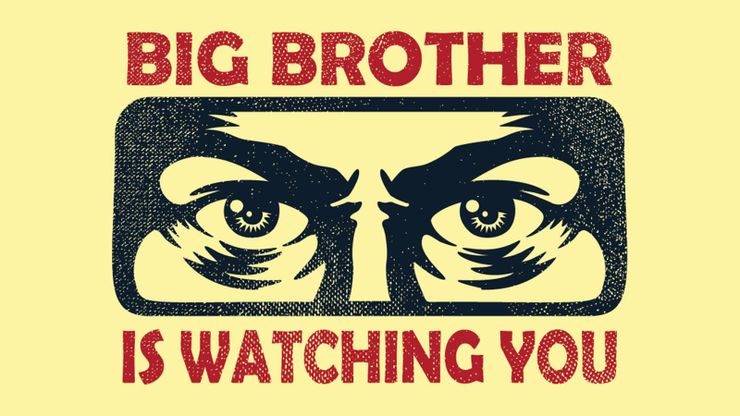
ACTING DIFFERENTLY WHEN OBSERVED
One of my sons-in-law is a television camera operator and has years of experience filming people and events from all over the world. From videotaping athletes at the Sochi Winter Paralympics to recording Queen Elizabeth II at Buckingham Palace, Sean has experienced first-hand what most of us intuitively know – people behave differently when viewed through the lens of a camera.
When a person realises that everything they say and do is being recorded for television, they become very aware that they are talking directly to the masses and will be evaluated and judged by a tough audience. While shy people withdraw further and outgoing people become gregarious in front of a camera, no one wants to look foolish, which is why everyone tries to put their best foot forward.
Police too have discovered that members of the public adjust their behaviour when they interact with a law enforcement officer who is wearing a body camera. Individuals – who might otherwise be aggressive or abusive towards police – tone down their actions when they know that they are being filmed and this avoids potentially volatile encounters. As noted in one report, the use of wearable body cameras represents a profound change in policing.
Anything that has been recorded can be subsequently reviewed, scrutinised and submitted as evidence. Individual officers become more accountable, and modify their behaviour accordingly, while the more disingenuous complaints from the public fall by the wayside once footage is likely to reveal them as frivolous.
People are invariably affected by observation as being watched makes us act differently. Even a poster containing the image of human eyes can encourage us to behave more honestly. This phenomenon is called the watching eyes effect and it was put to the test by a team of researchers from Newcastle University in the UK.
The team conducted a secret experiment and found that people put nearly three times as much money in an “honesty box” for payment of hot beverages when they were being watched by a fake pair of eyes on a poster, compared with a signboard which featured an image of flowers. This outcome reflects that while honesty may well be the best policy, it can leave us when no one else is watching.
Like fake eyes, cardboard replicas of police can also discourage wayward behaviour. After London’s metropolitan police placed two life-size cutout cops in two bicycle rack cages in a busy train station, bike theft decreased by 67 per cent. The inanimate cops acted as a psychological deterrent to thieves. The cutouts were like scarecrows and created the illusion of being observed.
Humans have a “gaze detection” system which activates when someone is staring at us. In the words of one psychologist:
… making direct eye contact is the most frequent and perhaps the most powerful non-verbal signal we exchange with others; it’s central to intimacy, intimidation, and social influence. Eye contact is so primal that its meaning extends across animal species: Predators stare intently before they pounce. Infants gaze at their parents to capture their attention.
It’s axiomatic that people tend to change their behaviour when under the prying gaze of others, particularly given our motivation to gain and maintain a positive social reputation. That’s why our behaviour while alone at home is likely to be different from our behaviour at work when surrounded by colleagues.
This extends to the world of social media where users carefully curate the information that they present to the digital world. Users are conscious of the myriad eyeballs which will scan their Twitter feeds and Facebook posts and the instant judgments which will be made about what they publish. So, they work diligently to leverage social media to boost their image as no one wants their personal online brand to be viewed in a poor light.
When it comes to being gawked at, we experience a “sixth sense” feeling that we are being watched and this enables us to detect things far beyond our conscious gaze. An article in New York (magazine) put it this way:
Most of us have experienced the feeling of being watched at some point, whether the gaze is unwanted (a creepy train stranger) or desired (an attractive new acquaintance at your friend’s house party). The sensations accompanying this phenomenon can sometimes feel almost paranormal – it’s as if you can physically feel the eyes of others boring into you, even without looking, or like you have a second pair of eyes on the back of your head.
From an evolutionary standpoint, our need to feel part of a group has been a key feature of the behaviour of Homo sapiens since our hunter-gatherer ancestors emerged on the Savanna plains of Africa around 200,000 years ago. We have a natural desire to be part of the crowd (herd mentality), with our primal need to connect being as fundamental as our need for food and water.
Because we are emotionally wired to care about what others think of us, our reputation is very important. This is certainly the case in the workplace where our personal brand differentiates us from co-workers. Jeff Bezos, the founder of Amazon, is credited with saying: “Your brand is what people say about you when you’re not in the room”.
In competitive work environments, it’s natural to want to stand out from the pack and be known as someone who delivers high performance outcomes. As outlined in a Harvard Business Review article:
Social psychologists have known for decades that people are motivated to work harder when others are watching. When they are observed, people run faster, are more creative, and think harder about problems. These effects occur for several reasons. For one, people want to impress others through their performance, and thus try harder. Anyone who has ever stayed in the office late when their boss was still around experienced this phenomenon.
In all walks of life, people behave differently – even righteously – in the presence of others. Let’s be honest: How many of us can say that we haven’t acted a bit selfishly when we thought we could get away with it? In the perfect world, we should always strive to be our noblest selves. As Thomas Jefferson wrote: “Whenever you do a thing, act as if all the world were watching”.
Well, the digital world is watching – from licence plate readers to aerial surveillance drones and facial recognition to smartphone trackers – spying eyes are everywhere. We are being monitored 24/7 and many people see this as an assault on personal privacy. Others contend that innocent people have nothing to hide and so have no need to look over their shoulder.
Regardless, the perception that the information age has put our privacy and security at risk is widespread. Research shows that just being aware that your Internet searches are being monitored makes people self-censor and that – according to civil libertarians – deters people from exercising their democratic right to access publicly available information.
Given the proliferation of surveillance technology, the watching eyes effect is everywhere. We are being watched more than any other time in history, both online and in the street, and this is impacting our decisions and actions. Mass surveillance is designed to keep us in line by tracking and influencing our behaviour – and we are increasingly subject to its gaze.
Big Brother is watching.
Regards
Paul J. Thomas
Chief Executive Officer
Ductus Consulting

